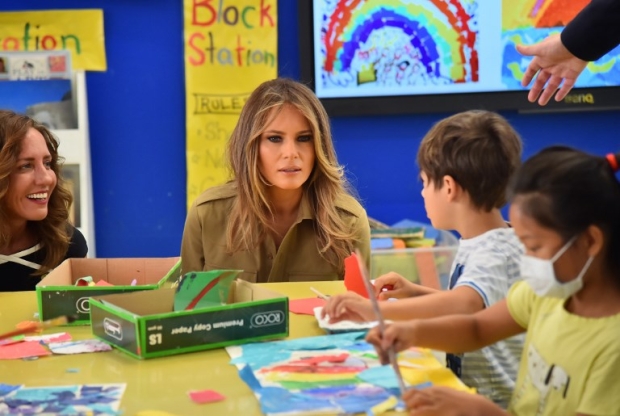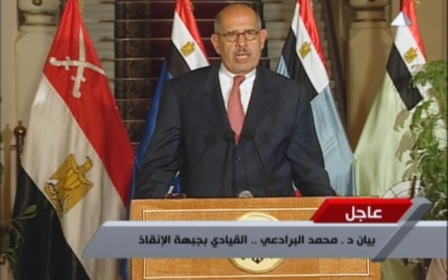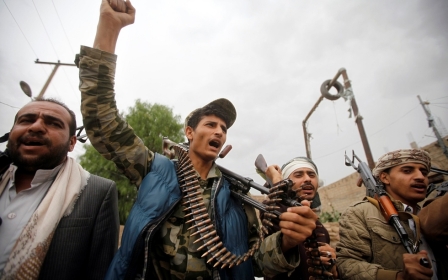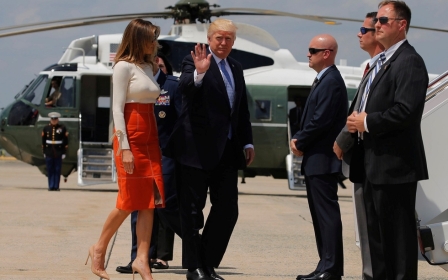Trump calls on Muslim nations to 'drive out' extremists in Saudi speech
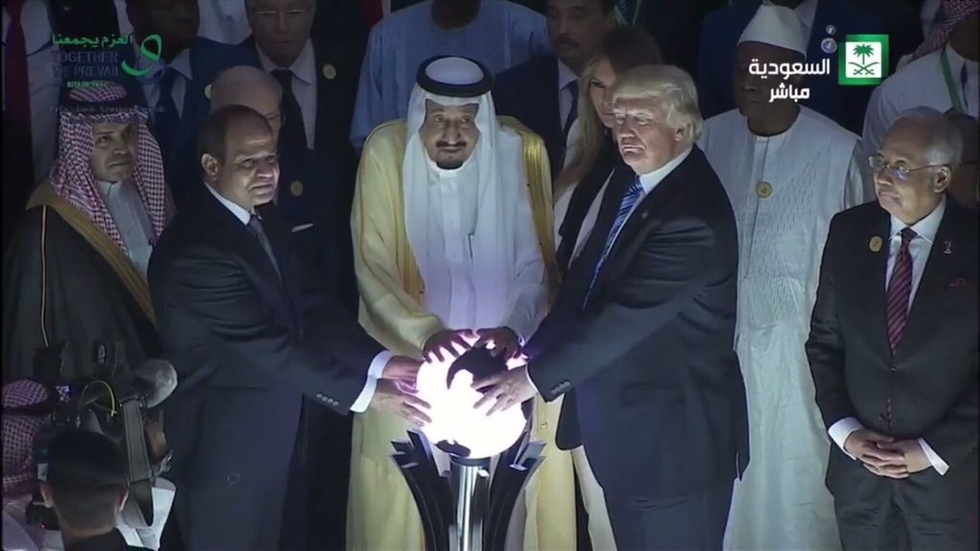
US President Donald Trump has called on Muslim nations to "drive out" extremists during a speech on Sunday in which he portrayed fighting terrorism as a "battle between good and evil" rather than a clash of civilisations.
"Our goal is a coalition of nations who share the aim of stamping out extremism and providing our children a hopeful future that does honour to God," Trump said, speaking to a room of dignitaries from a variety of Muslim countries.
He told his audience that Muslims were the primary victim of militant attacks and that "young Muslim boys and girls should be able to grow up free from fear, safe from violence and innocent of hatred".
'Drive them out. Drive them out of your places of worship. Drive them out of your communities. Drive them out of your holy land. And drive them out of this earth'
- US President Donald Trump
"ISIS, al-Qaeda, Hezbollah, Hamas and so many others must be counted not only in the number of dead, but also must be counted in generations of damaged dreams," he said.
"This region should not be a place from which refugees flee, but newcomers flock."
He said the US was "not here to lecture" or to "tell other people how to live, what do to do, who to be or how to worship".
"Every time a terrorist murders an innocent person and falsely invokes the name of God, it should be an insult to every person of faith," he said.
"Drive them out. Drive them out of your places of worship. Drive them out of your communities. Drive them out of your holy land. And drive them out of this earth."
He also had harsh words for Iran, branding it the number one exporter of terror in the region.
"From Lebanon to Iraq to Yemen, Iran funds arms and trains terrorists, militias and other extremist group that spread destruction and chaos across the region," he said, blaming the Islamic Republic for "bolstering" the Assad government in Syria.
He called on the delegates to "isolate Iran, deny it funding for terrorism" and "pray for the day the Iranian people have the just and righteous government they so rightly deserve".
The speech is part of a re-set effort with the Muslim world after Trump frequently attacked Muslims on the campaign trail last year and tried to ban many from entering the United States.
Struggling to contain a brewing political scandal at home, Trump kicked off his first foreign trip in Saudi Arabia, where he delivered the speech at an Arab Islamic American Summit.
The United States and Gulf Arab countries also signed an agreement on Sunday to coordinate their efforts against the financing of terrorist groups.
Saudi Crown Prince Mohammed bin Nayef and US Secretary of State Rex Tillerson signed the memorandum of understanding in Riyadh, where the six-nation Gulf Cooperation Council (GCC) is holding a summit with Trump.
"It's the, we hope, farthest-reaching commitment to not finance terrorist organisations that [the US] Treasury will be monitoring with each of their counterparts," said Dina Powell, White House deputy national security adviser for strategy.
"The unique piece of it is that every single one of them are signatories on how they're responsible and will actually prosecute the financing of terrorism, including individuals."
The GCC comprises Saudi Arabia, Qatar, Kuwait, Oman, the United Arab Emirates and Bahrain.
Western officials believe that people living in wealthy Gulf countries have been an important source of funding for Sunni Islamist groups fighting in Iraq and Syria, including the Islamic State group and al-Qaeda.
Hamas released a statement on Sunday, however, criticising Trump's characterisation of them as a "terrorist" group alongside IS and al-Qaeda.
"The statement describing Hamas as a terror group is rejected and is a distortion of our image and shows a complete bias to the Zionist occupation (Israel)," Hamas spokesman Fawzi Barhoum said.
'Very, very long-term relationship'
Trump also announced that Washington's relationship with Bahrain was set to improve after years of increased tension.
"Our countries have a wonderful relationship together, but there has been a little strain, but there won't be strain with this administration," Trump said during a photo session with Sheikh Hamad bin Issa al-Khalifa.
"We're going to have a very, very long-term relationship. I look forward to it very much - many of the same things in common."
Trump's White House decided this year to pursue a $5bn sale to Bahrain of 19 Lockheed Martin F-16 aircraft and related equipment, which was held up last year by human rights concerns.
With help from some other Gulf Arab states, Bahrain crushed a 2011 uprising inspired by the "Arab Spring" led by its Shia majority, which demanded more rights and representation.
The government accuses elements of the opposition of seeking to overthrow it by force with help from arch-foe Iran.
Meeting with Sisi
Trump also told Egyptian President Abdel Fattah al-Sisi on Sunday during talks in the Saudi capital that he would soon visit Egypt.
"We will absolutely be putting that on the list very soon," Trump said at the beginning of bilateral talks with Sisi.
Trump praised US relations with Egypt, describing the talks with Sisi as "very very important".
"We've really been through a lot together positively," he said.
Trump said that "safety seems to be very strong" in Egypt, which has seen deadly bombings and attacks on Christian Copts and security forces in past months.
Responding through an interpreter, Sisi said: "Egypt is secure and stable and is going very well with the cooperation of the United States.
"You are a unique personality that is capable of doing the impossible," Sisi said, addressing Trump.
"I agree," the billionaire president responded as everyone laughed.
Sisi has launched the toughest crackdown on Islamists in Egypt's modern history since toppling president Mohamed Morsi of the Muslim Brotherhood in 2013. Hundreds of Egyptian soldiers and police have been killed fighting militants in Sinai.
Last month, Egypt declared a three-month state of emergency after two church bombings claimed by the Islamic State group killed more than 45 people.
Sisi went to Washington last month for talks with Trump that were intended to improve relations that had been strained under president Barack Obama.
Egypt is one of Washington's closest allies in the Middle East, receiving $1.3bn in US military aid annually.
Trump thanked Sisi for his help with the release of Egyptian-American charity worker Aya Hijazi last month. Trump and his aides had engaged in behind-the-scenes diplomatic efforts to gain her freedom after attempts by the previous Obama administration failed.
New MEE newsletter: Jerusalem Dispatch
Sign up to get the latest insights and analysis on Israel-Palestine, alongside Turkey Unpacked and other MEE newsletters
Middle East Eye delivers independent and unrivalled coverage and analysis of the Middle East, North Africa and beyond. To learn more about republishing this content and the associated fees, please fill out this form. More about MEE can be found here.


